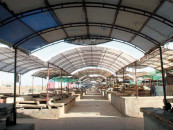ADB forecast
Growth this year was already expected to lag behind FY2022 because of several factors

The devastating floods will likely cancel out most of the economic growth in the current fiscal year, says a recent report released by the Asian Development Bank (ADB). Growth this year was already expected to lag behind FY2022 because of several factors, including record inflation and disruptions in the global supply chain that have affected most essential commodity prices. However, the ADB revised down its growth estimate even further in its new report, reducing it by a whole percentage point to just 3.5%.
Closer to home, aggressive policy measures to address the budget deficit and an impending balance of payments disaster — both of which contributed to last year’s 6% growth figure —also took their toll. But even that 3.5% estimate may paint a rosy picture, because the ADB’s country director noted that the floods and the damage in their wake have added “profound risk to the country’s economic outlook”. While the ADB is preparing a “package of relief, rehabilitation, and reconstruction”, which will have immediate and long-term support targets, unfortunately, on its own, it will only soften the blow of the floods.
Entirely offsetting the risks facing the economy would require almost every piece of the puzzle to fit perfectly, from flood-related reconstruction and economic reforms to suitable amounts of international financial support and stimulation of growth, while also protecting social and development programmes that support the most vulnerable population groups. How difficult that would be can be gauged from the fact that the economic sectors and indicators hit worst by the floods and policy tightening are the ones that exhibited the highest growth in recent years, including agriculture, services, industrial growth, and consumption. Meanwhile, inflation is expected to stay unusually high — at about 18%.
The ADB has also become another expert body that considers the IMF’s required reforms crucial to improving the country’s economic outlook, although it noted that the restoration of political stability is also a critical factor. Political stability actually ties back into the short-term risk factors as well, because even if the economic disruptions and drain on resources created by crippling protests are quickly sorted out, 2023 — at least the calendar year, if not the fiscal year — is also an election year, and Pakistan has a history of underperforming in election years, regardless of the actual election results.
Published in The Express Tribune, September 23rd, 2022.
Like Opinion & Editorial on Facebook, follow @ETOpEd on Twitter to receive all updates on all our daily pieces.















COMMENTS
Comments are moderated and generally will be posted if they are on-topic and not abusive.
For more information, please see our Comments FAQ